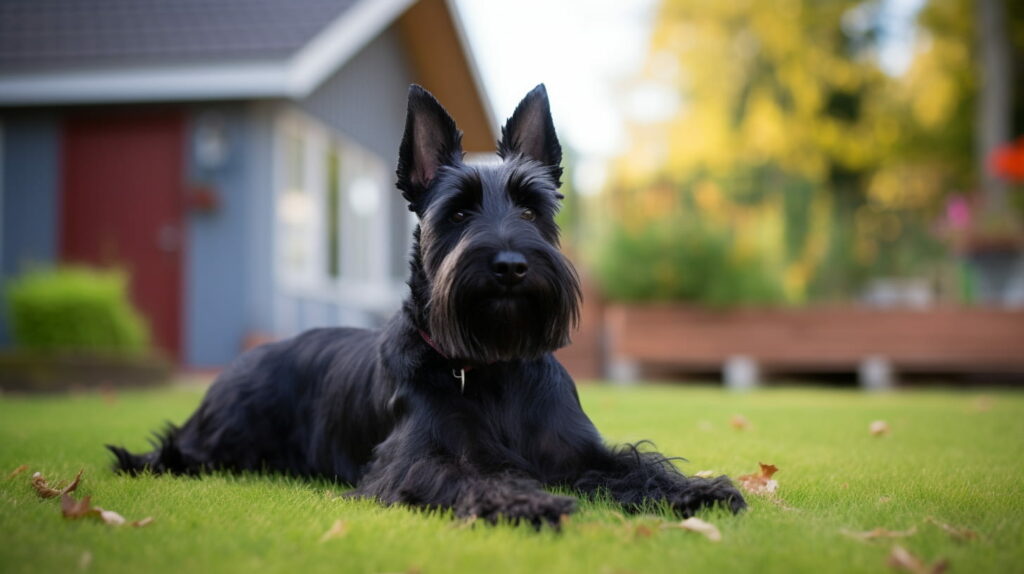Welcome to our article about the Scottish Terrier, a breed that is well-known for its loyalty and loving nature. This small and stout dog makes for an excellent family companion, offering both affection and protection to its human family members. In this article, we will explore the unique characteristics of the Scottish Terrier, as well as their history, temperament, training needs, health concerns, and more. Whether you are considering adding a Scottish Terrier to your family or simply want to learn more about this wonderful breed, we hope you will find this article informative and enjoyable.

Key Takeaways:
- The Scottish Terrier is known for being a loyal and affectionate family companion
- Throughout this article, we will explore the breed's history, characteristics, temperament, training needs, health concerns, and more
The History of the Scottish Terrier
The Scottish Terrier, also known as the Scottie, is a small and sturdy breed of dog that originated in Scotland. The breed has a long and illustrious history, with its origins dating back to the 16th century when it was used to hunt and dig for vermin and small game. The Scottish Terrier was initially part of a group of breeds collectively known as terriers, which were bred for their ability to hunt and kill rodents on farms and in homes.
Over time, the Scottish Terrier became a popular breed among the Scottish nobility, who prized it for its spirited personality, loyalty, and tenacity. The breed was frequently depicted in art and literature, including in the works of Sir Walter Scott and Rudyard Kipling. By the 19th century, the Scottish Terrier had gained popularity throughout the United Kingdom and had become a fixture in the homes of the middle and upper classes.
The Scottish Terrier in America
The Scottish Terrier was introduced to America in the late 1800s, where it quickly gained popularity among dog lovers. The breed was recognized by the American Kennel Club in 1885 and was one of the earliest breeds to be registered by the organization. The Scottish Terrier also won Best in Show at the Westminster Kennel Club Dog Show in 1911, 1945, and 1950, further cementing its place as a beloved breed in America.
Today, the Scottish Terrier is still a popular breed among dog lovers worldwide. Its distinctive appearance, independent personality, and unwavering loyalty continue to captivate and charm those who come in contact with it.
Scottish Terrier Characteristics
Scottish Terriers, also known as Scotties, are small but sturdy dogs with a distinctive look. Here are some of the key characteristics of the breed:
| Physical Characteristics | Traits |
|---|---|
| Size: | Scotties stand about 10 inches tall and typically weigh between 18 and 22 pounds. |
| Coat: | Their double coat is wiry and weather-resistant on top, with a soft undercoat. They come in a range of colors, including black, brindle, and wheaten. |
| Appearance: | Their distinctive look includes a long face, pointy ears, and a short tail. They have a broad chest and a muscular build. |
While they may look tough, Scottish Terriers are known for being loyal and affectionate family companions. Here are some of the personality traits you can expect from a Scottie:
- Loyal: Scotties are fiercely loyal to their owners and will protect them from perceived threats.
- Spirited: They have a playful and energetic personality, and enjoy chasing after objects and playing with their owners.
- Independent: As a terrier breed, Scottish Terriers have a bit of a stubborn streak and can be independent-minded.
- Loving: Despite their independent streak, Scotties are also known for being loving and affectionate with their families.
Scottish Terrier Temperament
The Scottish Terrier, or Scottie, is a small but mighty breed known for its bold and confident personality. They are loyal and affectionate towards their family members, but can be suspicious of strangers and other animals. Due to their terrier ancestry, they also have a strong prey drive and may chase after small animals.
Despite their small size, Scottish Terriers are known for their courage and determination. They are independent thinkers and can be stubborn at times, which can make training a challenge. However, with patience and positive reinforcement, Scotties can be trained to obey commands and perform tricks.
Scottish Terriers are spirited and playful, making them a great addition to any family. They are known for their loyalty and devotion to their owners, and are happiest when by their side. Due to their high energy levels, it is important for Scotties to get plenty of exercise and mental stimulation. Regular playtime or walks can help keep them happy and healthy.
Interactions with Children and Other Pets
Scottish Terriers can make great companions for children, but it is important to supervise their interactions. Due to their small size, they may be easily injured by rough play. Additionally, their terrier nature may cause them to be possessive of their toys or food, which can lead to conflicts with other pets. Socialization and training from a young age can help Scotties learn to coexist peacefully with other animals in the household.
In conclusion, Scottish Terriers are confident, spirited, and loyal companions. While they may have some training challenges due to their stubbornness, their loving nature and playful personalities make them a great addition to any family.
Scottish Terrier Training
Training a Scottish Terrier can be a challenging but rewarding experience. These intelligent dogs can be stubborn, and their independent nature requires a firm and consistent approach. Here are some training tips to help you and your Scottish Terrier succeed:
Start Early
Begin training your Scottish Terrier as early as possible. The first few months of a puppy's life are crucial for socialization and establishing good behavior patterns.
Use Positive Reinforcement
Scottish Terriers respond well to positive reinforcement, such as treats and praise. Use rewards to encourage good behavior and avoid punishment or harsh methods, which can lead to fear and anxiety.
Be Patient
Training a Scottish Terrier takes time and patience. Do not expect immediate results, and be prepared to repeat commands and routines until your dog understands them.
Focus on Basic Commands
Start with basic commands like "sit," "stay," and "come." Once your Scottish Terrier has mastered these, move on to more advanced commands and tricks.
Provide Mental Stimulation
Scottish Terriers are intelligent dogs that require mental stimulation to stay happy and healthy. Incorporate puzzle toys and games into your training routine to keep your dog engaged.
Use a Leash and Collar
Scottish Terriers have a strong prey drive, and they can become easily distracted when outside. Use a leash and collar for safety and to help your dog focus on training commands.
Enroll in Obedience Classes
Enrolling your Scottish Terrier in obedience classes can be a great way to socialize your dog and improve training techniques. Look for classes taught by experienced trainers who use positive reinforcement methods.
By following these training tips, you can build a strong bond with your Scottish Terrier while also ensuring good behavior and obedience.
Scottish Terrier Health
The Scottish Terrier is generally a healthy breed, but like all dogs, they can be prone to certain health conditions. It's important to be aware of these conditions to ensure your Scottish Terrier stays healthy and happy throughout their life.
Common Health Issues
One of the most common health issues in Scottish Terriers is a genetic condition called Scottie Cramp, which causes spasms and muscle stiffness. Other genetic conditions to watch for include Von Willebrand's disease, a bleeding disorder, and Hypothyroidism, which occurs when the thyroid gland doesn't produce enough hormones.
Scottish Terriers are also prone to a variety of skin issues, including allergies and dermatitis. They may also develop ear infections due to their floppy ears and need for regular cleaning.
Preventive Measures
To help prevent health issues, it's important to buy from a reputable breeder who conducts health screenings on their breeding dogs. You can also take preventive measures, such as regular grooming to prevent skin and ear issues, and ensuring your Scottish Terrier gets plenty of exercise and a healthy diet to prevent obesity and related health issues.
Care Guidelines
Regular veterinary check-ups are important to catch any health issues early on. Scottish Terriers may also benefit from a bi-annual dental cleaning, as they are prone to dental issues like tartar buildup and gingivitis. Ensuring your Scottish Terrier gets enough exercise and a healthy diet can also go a long way in promoting their overall health and well-being.
Grooming a Scottish Terrier
The Scottish Terrier's iconic wiry coat requires regular maintenance to keep it clean and healthy. Here are some tips for grooming your furry friend:
Coat Maintenance
Brush your Scottish Terrier's coat at least once a week to prevent matting and tangling. Use a slicker brush to remove loose hair and a comb to work out any knots. Trimming the hair around their ears, paws, and underbelly can also help reduce matting.
Bathing
Bathe your Scottish Terrier every two to three months, or as needed. Use a dog-specific shampoo and conditioner to avoid drying out their skin. Make sure to rinse thoroughly to avoid any leftover soap residue.
Professional Grooming
Consider taking your Scottish Terrier to a professional groomer every few months for a thorough grooming session. This can include a haircut, ear cleaning, and nail trimming.
Dental Care
Brush your Scottish Terrier's teeth regularly to prevent dental issues. Use a dog-specific toothpaste and toothbrush, and avoid using human products as they may be harmful to your pet.
Ear Maintenance
Check your Scottish Terrier's ears regularly for any signs of infection, such as redness or foul odor. Use a dog-specific ear cleaner to gently clean their ears as needed.
Eye Care
Clean any tear stains around your Scottish Terrier's eyes with a damp cloth. If you notice excessive tearing, consult with your veterinarian.

Scottish Terrier Care
If you are considering a Scottish Terrier as your new companion, it is essential to understand their care requirements. Here are some tips to keep your Scottish Terrier healthy and happy:
Exercise
Scottish Terriers are a moderately active breed that require regular exercise to maintain good health. Daily walks, playtime in the backyard, or interactive games will help keep your Scottish Terrier fit and prevent boredom.
Nutrition
A well-balanced diet is crucial for the health of your Scottish Terrier. Consult with your veterinarian to determine the best diet plan for your dog based on their age, weight, and activity level. Avoid overfeeding and providing unhealthy treats that can contribute to obesity and other health issues.
Grooming
Scottish Terriers have a dense, wiry coat that requires regular grooming to prevent matting and tangling. Brushing your dog a few times a week, along with periodic trimming and stripping of their coat, is essential to maintain their appearance and health. Other grooming needs include regular teeth brushing, ear cleaning, and nail trimming.
Veterinary Care
To keep your Scottish Terrier healthy, regular veterinary checkups are essential. Your veterinarian can provide preventive care, routine vaccinations, and medical treatment when needed. Early detection and treatment of health problems can ultimately lead to a better quality of life for your pet.
Environment
Scottish Terriers are adaptable and can do well in a variety of living situations. However, they prefer cooler climates and should not be left outside in hot weather. Provide a safe and comfortable living space, including a cozy bed, toys, and other items that promote mental and physical stimulation.
Training
Scottish Terriers are intelligent and independent dogs that can be stubborn and challenging to train. Positive reinforcement training methods work best, with consistency and patience being key. Early socialization and obedience training are essential to help your Scottish Terrier develop good manners and adapt to different situations.
Finding Scottish Terrier Breeders
If you're interested in acquiring a Scottish Terrier, it's important to find a reputable breeder to ensure a healthy and well-bred puppy. Here are some tips to help you find a good breeder:
- Check with breed clubs: Scottish Terrier breed clubs can be a great resource for finding reputable breeders. They can provide you with information about breeders in your area and answer any questions you have about the breed.
- Ask for referrals: If you know someone who owns a Scottish Terrier, ask them where they got their puppy and if they were satisfied with the breeder.
- Do your research: Before contacting a breeder, do some online research to make sure they have a good reputation and follow ethical breeding practices. Look for reviews or ratings from other puppy buyers.
- Visit the breeder: Once you've identified a potential breeder, visit their facility in person. Look for a clean and well-maintained environment, and observe the temperament and health of the dogs.
- Ask questions: A good breeder will be willing to answer any questions you have about the breed, their breeding practices, and the puppies they have available. They should also be willing to provide you with references from other puppy buyers.
Remember, acquiring a Scottish Terrier is a big commitment. Take the time to find a reputable breeder who can provide you with a healthy and well-socialized puppy.
Scottish Terrier Puppies: What to Expect
Bringing home a Scottish Terrier puppy is an exciting time, but it also requires careful attention and preparation. Here's what you can expect during the early stages of owning a Scottish Terrier puppy:
- Socialization: Socializing your Scottish Terrier puppy is crucial for their development. Expose them to various people, animals, and environments to help them develop into well-rounded, confident adults.
- Training: Scottish Terriers are intelligent dogs, but they can also be stubborn. Consistent and positive training is essential for them to learn commands and good behavior.
- Potty training: Potty training can be a challenge with any new puppy, but Scottish Terriers are known to be particularly difficult to train in this area. Consistency and patience are key.
- Chewing: Scottish Terrier puppies love to chew, and they will chew on anything they can get their teeth on. Provide them with plenty of appropriate toys and chews to redirect their chewing behavior.
- Health: Like all puppies, Scottish Terrier puppies require regular veterinary check-ups and vaccinations. Your vet can also advise you on specific health concerns and care for the breed.
- Responsibilities: Owning a Scottish Terrier puppy comes with a lot of responsibilities, including exercise, training, grooming, and providing proper nutrition. Be prepared to dedicate time and effort to ensure your puppy grows into a happy, healthy adult.
As with any new puppy, it's important to remember that Scottish Terriers require patience, consistency, and a lot of love and attention. With proper care and training, they make loyal and loving companions for years to come.
Scottish Terrier for Sale: Making the Right Choice
Buying a Scottish Terrier is an investment in a loyal and loving companion for many years to come. It is important to make an informed decision when choosing a breeder and a puppy, to ensure that you get a healthy and well-bred dog.
First and foremost, research reputable Scottish Terrier breeders in your area. Look for breeders who are members of the Scottish Terrier Club of America or other reputable kennel clubs. You can also ask for recommendations from your veterinarian or other Scottish Terrier owners.
When you find a breeder you are interested in, schedule a visit to their facility. Take note of the cleanliness and overall condition of the facility, as well as the health and temperament of their dogs. A reputable breeder will be happy to answer any questions you have about their breeding practices and will allow you to meet the puppy’s parents.
It is also important to inquire about the puppy’s health history. Ask for documentation of vaccinations, deworming treatments, and any medical issues the puppy may have had. A reputable breeder will have this information readily available and be transparent about the puppy’s health history.
When selecting a puppy, pay attention to its temperament and personality. Look for a puppy that is playful, energetic, and interacts well with people and other dogs. Be cautious of puppies that seem lethargic or overly anxious.
Finally, when purchasing a Scottish Terrier, be prepared to make a long-term commitment. These dogs require a significant amount of time, attention, and care. With proper training and socialization, a Scottish Terrier will become a loyal and loving member of your family for years to come.
Scottish Terrier as a Family Pet
The Scottish Terrier is an excellent choice for families looking for a loyal and loving companion. This breed is known for its affectionate nature and loyalty to its owners. They can make an ideal family pet due to their small size, adaptability to apartment living and compatibility with children.
Scottish Terriers are known to be highly adaptable and can adapt to a variety of living situations. Whether living in a small apartment or a large home, they are content as long as they receive the necessary attention and care from their owners.
When it comes to compatibility with children, Scottish Terriers are a great choice. They are affectionate and playful, making them a great companion for kids. However, it is essential to supervise interactions between children and dogs to ensure the safety of both.
It is essential to remember that Scottish Terriers can have a stubborn streak, which may require patience and consistent training. Positive reinforcement and setting boundaries from an early age can help establish good behavior in their adult years.
In conclusion, the Scottish Terrier can make an excellent family pet. They are loyal, loving and adaptable, making them an excellent choice for families of all sizes. With proper training and socialization, they can make a wonderful addition to any family.
Training Tips for Scottish Terrier Owners
Training a Scottish Terrier can be challenging due to their strong-willed personality and stubborn streak. However, with patience, consistency, and positive reinforcement techniques, you can successfully train your Scottish Terrier to be a well-behaved and obedient companion.
Here are some training tips to help you get started:
- Start early: Begin training your Scottish Terrier puppy as soon as possible, ideally at 12-16 weeks old. Early socialization and training will help prevent bad habits from forming and ensure a well-behaved adult dog.
- Be consistent: Consistency is key when training a Scottish Terrier. Use the same commands and rewards every time and avoid confusing your dog with mixed signals.
- Positive reinforcement: Scottish Terriers respond well to positive reinforcement techniques such as treats, praise, and playtime. Reward good behavior and ignore bad behavior.
- Avoid punishment: Punishing your Scottish Terrier can lead to negative associations with training and can damage your relationship with your dog. Instead, redirect their behavior or use positive reinforcement to encourage good behavior.
- Keep training sessions short: Scottish Terriers have a short attention span, so keep training sessions brief (around 10-15 minutes) and frequent (several times a day).
- Be patient: Scottish Terriers can be stubborn and may take longer to train than other breeds. Be patient and persistent, and remember that every dog learns at their own pace.
By following these training tips and techniques, you can successfully train your Scottish Terrier to be a well-behaved and obedient companion that enjoys spending time with you and your family.
Conclusion
The Scottish Terrier is a loyal and loving family companion that possesses unique qualities and characteristics. With its spirited personality and unwavering loyalty, this breed has become a popular choice for families across the United States. From their distinctive appearance and temperament to their training and health needs, Scottish Terriers require proper care and attention to thrive.
When searching for a Scottish Terrier, it is essential to research and select a reputable breeder to ensure the acquisition of a healthy and well-bred puppy. With proper socialization and training, Scottish Terrier puppies can grow into well-behaved and obedient adult dogs that make wonderful family pets. As responsible owners, it is our duty to provide them with the necessary care, including exercise, nutrition, and regular veterinary check-ups, to ensure their well-being.
Training a Scottish Terrier can be challenging but rewarding. As intelligent and independent dogs, they require patience and understanding, as well as positive reinforcement techniques to achieve success. With proper training, Scottish Terriers can become well-behaved family members that bring joy and happiness to our lives.
In conclusion, the Scottish Terrier is a cherished breed that offers companionship, loyalty, and love to families across the United States. With proper care and attention, they can thrive and become cherished members of our families for years to come.
FAQ
Q: Can Scottish Terriers be good family pets?
A: Yes, Scottish Terriers can make excellent family pets. They are loyal, loving, and great with children.
Q: Do Scottish Terriers require a lot of grooming?
A: Yes, Scottish Terriers have a double coat that requires regular brushing and occasional professional grooming.
Q: Are Scottish Terriers easy to train?
A: Scottish Terriers are intelligent but can be stubborn, so consistent and patient training is recommended.
Q: What are the common health issues in Scottish Terriers?
A: Scottish Terriers are prone to certain health issues such as Scottie cramp, Von Willebrand's disease, and bladder cancer.
Q: How much exercise do Scottish Terriers need?
A: Scottish Terriers require daily exercise, including walks and playtime, to keep them physically and mentally stimulated.
Q: How can I find reputable Scottish Terrier breeders?
A: It's important to research and visit multiple breeders, ask for referrals, and ensure they follow responsible breeding practices.
Q: What should I expect when owning a Scottish Terrier puppy?
A: Scottish Terrier puppies require socialization, consistent training, and plenty of love and attention to grow into well-rounded dogs.
Q: What factors should I consider when purchasing a Scottish Terrier?
A: When buying a Scottish Terrier, consider the breeder's reputation, health clearances, and the overall temperament of the puppy.
Q: Are Scottish Terriers suitable for families with children?
A: Yes, Scottish Terriers can be great companions for families with children, but supervision and proper introductions are essential.
Q: What are some training tips for Scottish Terrier owners?
A: Consistency, positive reinforcement, and patience are key when training a Scottish Terrier. It's also important to address their independent nature.


